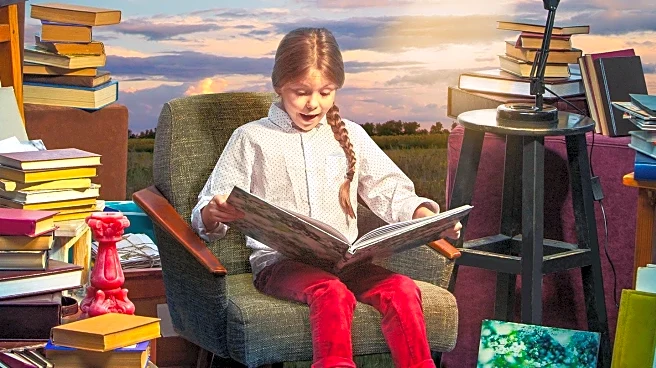What's Happening?
Alexandra Villasante, author of the new YA novel 'Fireblooms', is actively involved in promoting Latinx representation in children's literature through her work with the Latinx Kidlit Book Festival. The festival aims to increase the visibility of Latinx stories and creators, addressing the disparity between the Latinx population and their representation in published children's books. Villasante's novel 'Fireblooms' explores themes of privacy and freedom in a technologically controlled society, reflecting her interest in nuanced storytelling. Her involvement in the festival is driven by a desire to see Latinx stories on all bookshelves, fostering empathy and understanding in the current political climate.
Why It's Important?
The push for greater Latinx representation in children's literature is crucial in a diverse society where cultural narratives are underrepresented. With Latinx authors accounting for only 7% of published children's books, despite making up 27% of the population, initiatives like the Latinx Kidlit Book Festival are vital for bridging this gap. By promoting Latinx stories, the festival not only enriches the literary landscape but also empowers Latinx creators and readers, fostering a sense of identity and belonging. Villasante's efforts highlight the importance of diverse voices in literature, which can lead to broader societal empathy and understanding.
What's Next?
Villasante continues to work on projects that challenge societal norms and explore cultural identity. Her upcoming short story 'Quinceañera House' delves into horror themes, reflecting her interest in exploring societal and intergenerational fears. As she expands her creative repertoire, Villasante remains committed to her advocacy for Latinx representation, ensuring that these narratives continue to gain visibility and impact the literary world.
Beyond the Headlines
The Latinx Kidlit Book Festival not only promotes representation but also serves as a platform for cultural exchange and dialogue. By connecting authors, educators, and readers, the festival fosters a community that values diverse perspectives and encourages critical thinking. This initiative contributes to a broader cultural shift towards inclusivity and recognition of minority voices in literature.








